- Home
- Michael Swanwick
Vacuum Flowers Page 3
Vacuum Flowers Read online
Page 3
Outside, she ran blindly down the hot and heavy corridors of downtown. She fled randomly, through crowded galleries and empty alleyways, until she was gasping for breath and covered with sweat and her fear rose up and swallowed her.
2
KING JONAMON’S COURT
An indefinite time later, Rebel found a cluster of data ports in the center of a tiled courtyard. She had no idea where she was. Someplace midtown, to judge by the gravity. Jungle birds flitted between crowded boutiques. A sheet waterfall splashed into a shallow pool. By its edge, a vender sold copper coins to throw into the water.
Without her telling it to, Rebel’s body drifted to a data port. Her head felt buzzy and light, as if it belonged to somebody else. From a vast distance she watched her fingers touch the screen twice, programming it for realtime communication. They tapped in an access code, and she wondered who it was for.
A male face appeared in the port. It floated in blackness, with no visual backdrop. Under a painted constellation of five-pointed gold stars, the eyebrows rose in surprise. “It’s been a long time.”
Rebel listened with detached fascination as a shrill, rapid voice from her own mouth said, “I have to hide. I have to crawl under my face and pull it in after me. I have to get away.” Her face began to cry. “I don’t have any money and I can’t trust anyone and I need your help.”
The stranger’s face shifted, startled and alarmed. “My God, what have you done to yourself, Eucra—?”
“Don’t use my name!”
Blank astonishment. Then, another instant shift of expression and the man grinned. “Gotcha, Sunshine. Listen, my shift has just started, but maybe you should join me anyway. I’m a vacuum bum these days, scraping flowers, nobody’s going to look for you rockside. You think you can find your way to the Labor Exchange using public transit?”
Rebel wasn’t following the conversation at all. Her head nodded.
“Okay, once you get there, go to the Storage and Maintenance gate. Tell them you want work as a scraper—we’re always shorthanded; they’ll give it to you. Mention my name so they put you on the right crew. It’s all piecework; they don’t care diddly-squat whether you put in a full shift. I’ll have them issue you vacuum gear against my account. That clear? Think you can do that?”
Her body took a deep breath. Her voice said, “Yeah.”
Rebel was scraping vacuum flowers off the surface of Eros when she came up from under.
It was dull, nasty work. The shiny blue blossoms were surprisingly elusive. Her visor polarized out glare, turning the bright flowers into a field of black stars. She had to reach into darkness to find them. Their stems were as thin as wires and tougher. Worst of all, the gravity was so slight that a careless move would send her bounding meters away. She hovered over the rock, keeping afloat with touches of toe and finger as she angled her clippers under each bloom. Her muscles ached with tension and fatigue.
The inside of her vacuum suit stank, and her collecting bag was only half full. It dragged behind her like the abdomen of a queen bee. Her helmet buzzed with voices as the work gang traded chitchat on the intercom channel. “… and I swear no lie,” a male voice drawled, “I was the suavest thing on two legs. They throw in a hardpacket of etiquette with the persona, you with me? So I know what fork you use to pick your nose with, and all. Not only was I suave out in public, I was even suave sexing it up afterwards.”
“Oh yeah? Maybe I oughta try you out,” said an amused female voice.
“Tamara, honey, the onliest thing less likely than me sexing you up is me admitting to sexing you up.” Hoots of laughter. “You get one of your menfriends to try this program, though. I mean that.”
“Hell,” went a second female voice, “one of Tamara’s menfriends gets suave, and he’ll—”
She snapped off the intercom. Something was shifting within her, and she didn’t know who she was, Eucrasia or Rebel. Rebel or Eucrasia. “Let go,” she whispered savagely, and she was herself again: Rebel. But a sense of her other self lingered, hovering over her. She hunched her shoulders and ignored it as best she could and kept on scraping flowers.
The work was soothing. Her fingers moved with a will of their own, clipping flowers and stuffing them into the mesh bag at a regular, efficient rate. Ahead of her, endless mats of vacuum flowers unfolded to the horizon, each bloom the size of a human head, but so fragile it crumpled to nothing at the touch of a gloved finger.
The sense of Other remained, though, until her entire back itched with the touch of imagined eyes and she glanced back over her shoulder.
There was no one there. Just a stretch of bare rock and harsh shadow and, in the distance, a few low utility buildings and several freight lots. The lots were simply areas where the rock had been ground flat for storage purposes. Some were vacant. On others, orange and green and yellow crates were piled skyscraper-high. Machines as delicately jointed as mosquitos climbed the stacks, adding and removing crates. Below them, vacuum bums wrestled more crates from magnetic cushions or into elevators, standing back as the cargo was flung up and away.
What are you hanging around for? Rebel thought angrily. She felt like crying, but sternly suppressed the urge—tears were a bitch in vacuum gear. I won’t step aside for you. This is my mind now.
A scrap of trash lightly hit the surface near Rebel, bounced up, and floated slowly downward, orange and red and twinkling. A crushed bit of packaging for something that had been consumed somewhere in near orbit. Rebel reached down, tried to gather too many blossoms at once, and received a small shock through her work gloves as the flowers shorted out. “Oh, shit!” She flung the things down in disgust and sat up. A cannister city was lifting up over the flower-bright horizon. She could see a random scatter of habitat lights through a window wall, small and bright, like inner stars. And now it came to Rebel that she was on the strange planet she had seen from the hospital. Eros. She was on the asteroid Eros in the center of Eros Kluster.
Just like that, Eucrasia’s ghost was gone, vanished like a bubble in vacuum.
Rebel looped her bag’s tieline over a rock outcrop, pulled it snug, and rolled over on her back, letting the light wash over and through her.
Staring into the Kluster, she again felt mingled familiarity and awe. Spread against the starscape was an artificial galaxy of spinning wheels, variable gravity factories, geodesic towns, warehousing grids, slagsided cylinders, farming spheres … an infinity of structures, all painted in miles-wide supergraphics and bright as small suns. Counterspinward, to the Kluster’s trailing edge, the arrays of refinery mirrors were awash in waste light. Starward, robot lightsails tacked and lofted, bringing in semiprocessed ores. Closeby, access craft and vacuum-suited spacejacks twisted through thin lines of traffic holograms. For an instant she almost choked on the beauty, the complexity of it. She wanted to laugh or to cry. And then—
“Heads up, Sunshine!”
A gloved hand slapped her helmet, switching on the intercom. Rebel shot to her feet, went tumbling, and was pulled back by a man in a floral print vacuum suit. Five-pointed yellow stars, in the pattern of the Northern Cross, dominated the print. In the helmet’s gold visor she saw her reflection, with a smaller, distorted image of the man on her own visor. He jerked a thumb upward. “Shift’s over. Time to bounce home.”
The man loped off in slow, ludicrous low-gee hops, and Rebel followed. He was built tall and gangly, with narrow hips and tight little buns.
Bouncing in from all points, the work gang converged on the shabby elevator. One by one they floated harvest bags into the field, watched them flung upward, and followed suit themselves. Their work garb was all customized with iridescent planetscapes, clouds-and-rainbows, mock Mondrians, Pollocks, Van Goghs. Rebel glanced down at her own suit. Silvery and unmarked.
“Here you go, Sunshine. Slip this on the tieline.” The man gave her a slug of iron with a hole in its center. She snugged the line and wrangled her bag forward. It vanished. “Listen,” she said, “we’ve
got to talk.”
“Yes, but not here.” He touched the small of her back and lofted her into the elevator.
The field nabbed her. With heart-stopping suddenness, the asteroid shrank beneath her. She could see it as a whole again, the way she had from New High Kamden, an awkwardly lopsided spindle of a planet with continents that burned a metallic blue-white, and seas of ink. The seas were areas scraped clean of the flowers. A traffic redirector snatched her, and the asteroid veered wildly away, and the Labor Exchange geodesic exploded in her face. She plowed into the magnetic cushion, slowed, stopped, and was nudged gently to an airlock.
The bourse was aswarm with workers. Rebel swam in, past new shifts that were suiting up and leaving. Completed shifts kicked by, laughing and chattering, folding back helmets and shucking their suits. She followed a rainbow-print suit that had been in her work gang and rode a mag line to the Storage and Maintenance gate. A large-breasted paymaster sat in knee rings there, holding a salary machine in her lap. “Step it up,” she snapped.
Hastily, Rebel pulled off a glove and inserted her hand in the machine. It read her prints, calculated mass of flowers scraped, and extruded a thin silver bracelet. It felt odd on her wrist. She kicked off and the rainbow suit was nowhere to be seen. She had no idea where she should go now.
Then someone bounced lightly against her, nudging her into a mag line. “See you on the other side, Sunshine,” he said, and she shot through a doorway. That same man. At line’s end, she almost missed the grab bar because she was craning about, trying in vain for a glimpse of his face.
She followed a burly woman into the locker room. Aping the woman’s actions, she collapsed her suit, stuffing it and her cache-sexe into the helmet along with the cheap set of arm and leg bands she’d been issued, and dumped the lot into a cleaning chute. Then she kicked into the showers. She washed with a soaped towel, rinsed with a wet one, and kicked back into the lockers.
The locker room was a pentagonal tube, with lockers on all the walls. Rebel floated among the laughing, chattering women, and couldn’t remember which locker was hers. But the memory was there, even if she couldn’t acess it. Her body knew what to do. She let it go where it wished, and came to a locker that opened at her touch. Inside were her clothes and work gear, freshly cleaned.
Anchoring herself in a foot ring, she donned cache-sexe and travel bands. Then she slipped into the knee rings and popped up a mirror. That same disconcerting, button-nosed face stared at her from her reflection.
All about her, women were dressing and reprogramming themselves, painting their faces to match their new personas. The room was full of marilyns and pollyannas, the occasional zelda, even a suzy vacuum. A xaviera, seeing her frozen in indecision, paused from painting her lips vulval pink and proffered her wafer. “Here you go, honey. Open wide and give it a try.”
Rebel blushed and looked away, and the women hooted with laughter. She snatched up her things and fled, her face as naked as the day she was born.
Outside, a man grabbed her elbow, and without even thinking, she punched him in the stomach. He doubled over into his cloak and floated away backwards, a perfectly amazed look on his face.
Then Rebel saw the stars painted across the man’s face and realized that this was the stranger she had called. Flustered, she reached out to steady him, but he had already snagged a grab bar and was watching her with a closed and wary expression.
“Listen, I’m sorry,” Rebel said. “I didn’t mean to hit you. I’m sorry I even called you in the first place. Why don’t we just shake hands and go our separate ways?”
The stranger regarded her steadily. “You’re not Eucrasia anymore, are you?”
She met his gaze. His eyes were green. “No.”
Briefly, the man’s face went blank, as if he were arguing with himself. Then it cleared and he said, “Look. I live in King Jonamon’s court, Tank Fourteen. That’s probably the best place you could go, if you’re on the run from something. There’s a couple of shacks empty. Come with me, and I’ll stake you to the first week’s rent.”
“Why would you do something like that for me?” Rebel asked suspiciously. “Just who are you, anyway?”
“I’m … an old acquaintance. A fellow-worker.” He tapped behind one ear, and Rebel saw a small red abrasion circle there. “We persona bums have to stick together, right?”
“I …” Rebel retreated into the folds of her cloak. “Look. I’m sorry. It’s just that people have been taking a lot of interest in my case lately. I didn’t ask for any of it. I don’t want any of it.”
“Okay, then.” He shrugged and turned away.
Something desperate came tearing up from deep within Rebel then; and she cried, “Wait!” The man turned back. That cautious face. She colored, because she had no idea why she had cried out. To cover, she said, “Maybe I was a little hasty.”
Another instantaneous shift of expression, and the man laughed heartily. “You crack me up, Sunshine.”
“Don’t call me that!”
“All right. Eucrasia, then.”
Her face felt cold and hard. “The name is Rebel,” she said. “Rebel Elizabeth Mudlark.”
“Wyeth.” A lopsided grin and a shrug said that that was all the name he had.
They took a jitney to the tank towns, crammed hip and knee with twenty others, almost too tight to breathe. It carried them to the shadow of the Londongrad cannister, where a cluster of fifty-year-old air tanks floated. They were enormous things, each large enough to hold an entire cannister city’s atmosphere under pressure, and retrofitted with crude airlock and docking facilities. Faint traces of rust edged the locks, where the long whisper of oxygen leakage ghosted over metal.
“Jeez, it’s hot in here,” Rebel grumbled. “I should’ve just gone solo in my suit.”
“What’s that?” Wyeth asked. Then, when she repeated herself, “Tank towns don’t have magnetic cushions. We’re talking heavy-duty slums here.”
The jitney pilot slammed into a dock and bawled, “Tank Fourteen!” and they squeezed out.
The light was dim at the locks and murky beyond. They swam up a crowded corridor, through ramshackle hutches that were no more than pipework frames with corrugated tin sheets for walls. The air was fetid with rotting garbage, stale wine, and human sweat, with a sweet undersmell of honeysuckle. Children shrieked at play, and there was a constant yabber-yab-ber-yabber of voices. Bees hummed as they moved mazily among the flowery vines that overgrew everything. A green rope led up the corridor, and they followed this handway, occasionally grabbing it to twist clear of an oncomer, until it was crossed by an orange rope. They took this deep into the tank.
A raver came down the rope, and people shrank away from her. Wyeth grabbed Rebel and pulled her out of the way. They slammed noisily against a tin wall, and then the woman was gone and they proceeded up the rope.
Now and then light spilled from a doorway, or a string of lanterns lined a cluster of informal shops and bars, places where people offered alcohol or other goods from their own homes. Everywhere the vines were thick and lush, with frequent bio-fluorescent blooms. There were sections where the flowers provided the only illumination. “This is awful,” Rebel said.
Wyeth peered about; as if trying to detect what flaw she saw in his world. “How so?”
“It’s like a parody of my home. I mean, if you know the biological arts, there’s no excuse for this kind of squalor. Back home, the cities are …”
“Are what?” Wyeth asked.
But the hard, undeniable truth was that she could not remember. Not a thing. She tried to recall the name of her city, the faces of her friends, her childhood, the kind of life she’d led, and none of it would come. Her past was an impressionistic blur, all bright colors and emotions, with no fine detail. “I don’t know,” she admitted.
“Sunshine, your answers are about as revealing as your silence.” Wyeth touched her arm. “Here we are!” He grabbed the rope to stop himself, flipped over, and kicked throu
gh an opening between hutches. Rebel followed.
A skeletally thin old man leaned out of a shanty window into the entraceway. “Hallo, Jonamon. How’s the kidneys?” Wyeth said. He was wearing his laughing face. “Got a new tenant for you.”
“Hallo yourself.” The old man’s skin was fishbelly white, and red blotches ran over his bald pate. “Rent’s due tomorrow.” Then he noticed Rebel, and pursed his lips suspiciously. “You the religious type, girlie?”
Rebel shook her head.
“Then where’s your paint?” He jabbed a bony finger at the abrasion circle behind Rebel’s ear, and said to Wyeth, “You put the mark on her! Don’t allow none of that shit in my court. I run a clean place here—no drunks, no whores, no burn cases, and no reprogramming. I don’t care what kind of excuse you got, God don’t like—”
“Hold on, hold on—nobody’s reprogramming anybody!” Wyeth said. “What are you ragging on me for? The lady’s right here, you can ask her for yourself.”
“Be damned if I won’t.” The old man swam out the window, chasing them into the courtyard. Then he grabbed the side of his hutch, muttered, “Damn! Forgot the book,” and darted back through the window.
The courtyard was just a large, open space fronted on by some dozen or so hutches. Three ropes crisscrossed the area, tied to outcroppings of pipe. Here and there people clung to them, chatting or working on private tasks. A young man sat wedged in a doorway, playing guitar.
“I’m sorry about this,” Wyeth said. “Old Jonamon is a terrible snoop, even worse than most landlords. He was a rock prospector seventy years back, one of the last, and he thinks that gives him the right to pester you half to death. If you don’t feel like facing him, I think I can put him off for a day or so. That’d give us time to find you a place nearby.”
“Actually,” Rebel had been chewing thoughtfully on a thumbnail; now she spat out what she had gnawed off, “I think I would like to talk about it. All these weird things have been happening to me, and I haven’t had the chance to sort them out. And I guess I owe you some kind of explanation too.” She frowned. “Only maybe I’d better not. I mean, there are people out there looking for me. If word got out—”

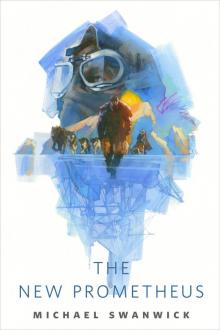 The New Prometheus
The New Prometheus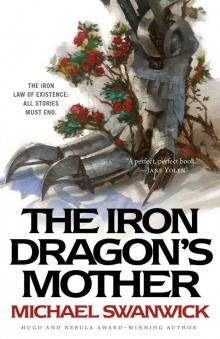 The Iron Dragon’s Mother
The Iron Dragon’s Mother The Mongolian Wizard Stories
The Mongolian Wizard Stories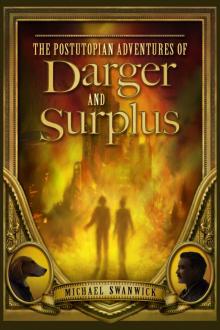 The Postutopian Adventures of Darger and Surplus
The Postutopian Adventures of Darger and Surplus Day of the Kraken
Day of the Kraken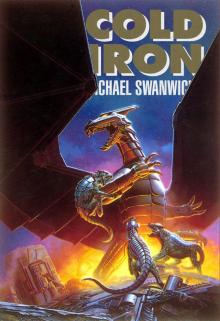 Cold Iron
Cold Iron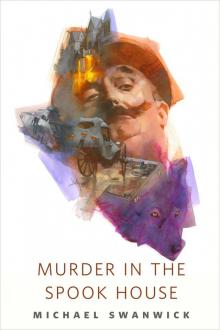 Murder in the Spook House: A Tor.com Original
Murder in the Spook House: A Tor.com Original Radio Waves
Radio Waves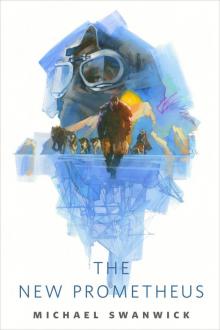 The New Prometheus: A Tor.com Original
The New Prometheus: A Tor.com Original Stations of the Tide
Stations of the Tide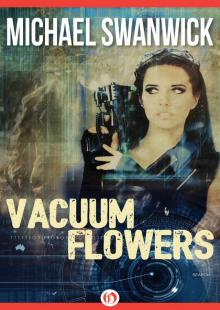 Vacuum Flowers
Vacuum Flowers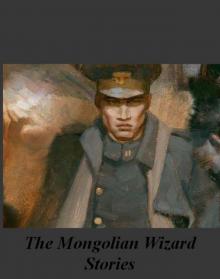 The Mongolian Wizard Stories (online stories 1-7)
The Mongolian Wizard Stories (online stories 1-7)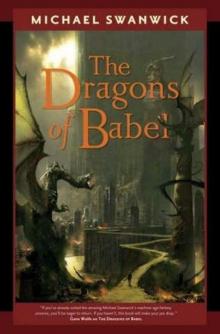 The Dragons of Babel
The Dragons of Babel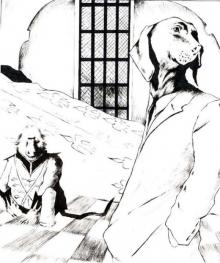 The Dog Said Bow-Wow
The Dog Said Bow-Wow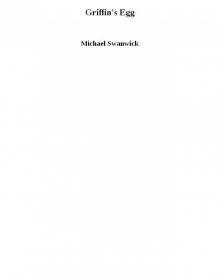 Griffin's Egg
Griffin's Egg The Best of Michael Swanwick
The Best of Michael Swanwick Not So Much, Said the Cat
Not So Much, Said the Cat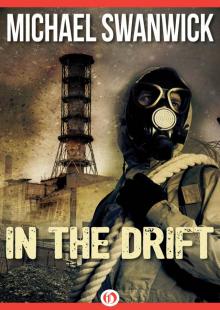 In the Drift
In the Drift Vacumn Flowers
Vacumn Flowers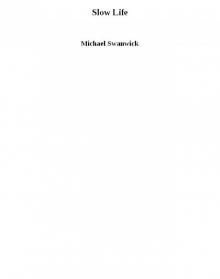 Slow Life
Slow Life The Wisdom Of Old Earth
The Wisdom Of Old Earth Legions In Time
Legions In Time Scherzo with Tyrannosaur
Scherzo with Tyrannosaur The Year's Best Science Fiction (2008 Edition)
The Year's Best Science Fiction (2008 Edition)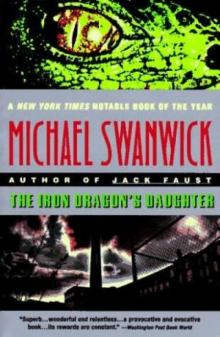 The Iron Dragon's Daughter
The Iron Dragon's Daughter The Very Pulse of the Machine
The Very Pulse of the Machine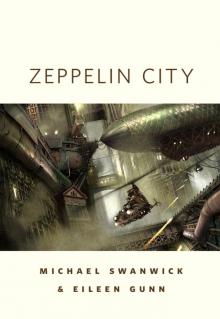 Zeppelin City
Zeppelin City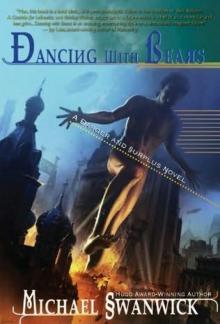 Dancing with Bears
Dancing with Bears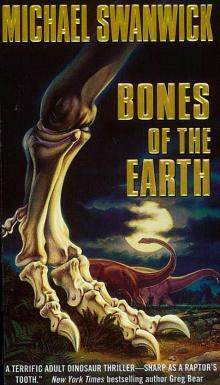 Bones of the Earth
Bones of the Earth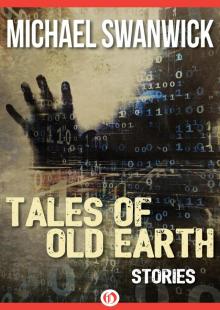 Tales of Old Earth
Tales of Old Earth Trojan Horse
Trojan Horse Radiant Doors
Radiant Doors